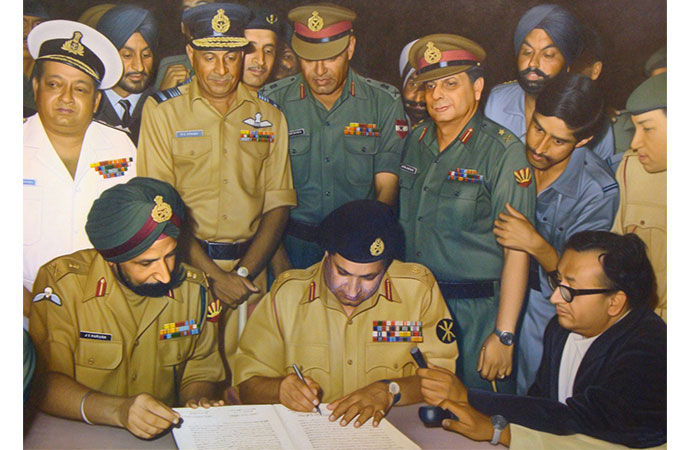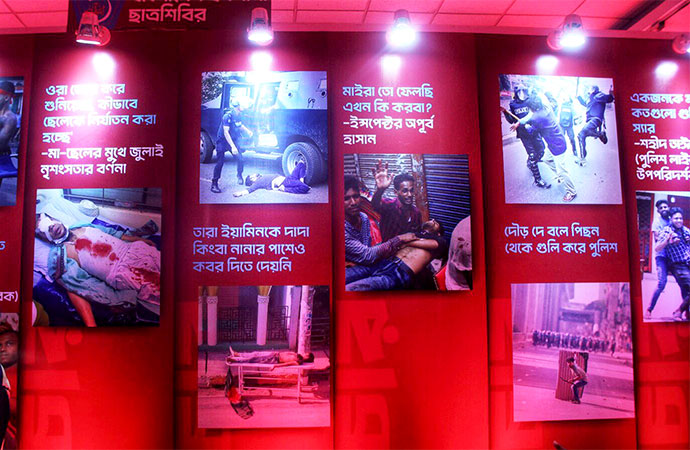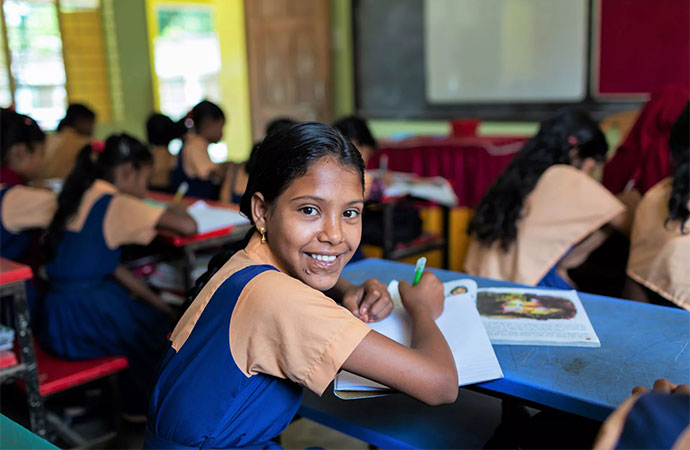Column

Indian general Jagjit Singh Aurora (1916-2005) pictured on left pointing to the surrender documents as he instructs Pakistan Army general Amir Abdullah Khan Niazi (1915-2004) where to sign in a surrender meeting at Ramna racecourse in Dhaka, East Pakistan on 16th December 1971. The signing of the surrender documents would mark the end of fighting in the Bangladesh Liberation War. Photo: Collected
By the time of the day, Niazi had surrendered and the Pak army was packing their bags under watchful Indian eyes, the city had broken loose. We were near the Shahbagh Hotel - now Bangabandhu Sheikh Mujib Medical University S- and saw the Indian soldiers walking by. Yes, walking, not marching, very relaxed, no tension feeling was all over. We shouted "Joy Bangla" and they shouted back saying the same. It was all very brotherly. We were not the slogan shouting type but the moment deserved it, I guess. Victory was ours. Or to many, the Pakistan army was gone. We turned around and headed home.
It was several days since we had headed home at normal hours. Dhaka had gotten ready for a long siege and even clashes between the Indo-Bangla forces and the Pakistanis. That mercifully didn't happen. By then we had been camping the nights in different derelict offices and hearing the marching sound of Pakistan army boots walking back to the Dhaka cantonment one last time. It can't have been a nice moment for them.
2
A couple of hours earlier, my dad was walking around the neighbourhood beating his chest in joy type of expression. He had been transferred to Pakistan in the December 1970 cyclone as a punishment for granting security free small loans to people in the cyclone affected areas. He went on leave hoping that things would get better after the elections. In fact, he was then being talked of as the next all Pakistan boss of the bank he served but March 25 intervened.
He spent the rest of the year claiming to be heart patient and undergoing medical tests regularly to prove his claim to his bosses. Such is the testament of the time that the medical Board did say he was very sick thrice but finally, he was told to join or be sacked. He had no option but to agree and was getting ready to leave for Karachi when the war intervened and he never did have to take the plan. So there was one happy man on December 16, 1971.
3
It's hard to explain what people felt because there were so many emotions at work. It wasn't pure joy and happiness either because soon after lunch, news began to come through about missing people. Soon it had moved from vague rumours to certain news. And it was clear that the people who were missing included those known to all, the eminent ones. This included my father's doctor and friend Dr. Rabbi and my own ophthalmologist Dr. Alim Chowdhury. Suddenly the names began to grow and it was no longer an unreal horrific nightmare but the very real news that family friends had been picked up and missing. And the killers were local enforcers of the Pakistan army.
I remember bringing out a gun and laying it out for use if necessary. I hardly knew what was going on but everyone was apprehensive. This wasn't a general killing spree as we were seeing in 1971 but targeted killing and none knew who the chosen ones were. We were trying to be ready, everyone was. The shine of the Victory Day was wiped away by the news of the killings.
4
By 4 is in the afternoon, the sound of gunfire was everywhere. Young men with guns were roaming around and with a broad smile on their lips firing in the air. This wasn't just a celebration or display of machismo but some kind of relief as well. The gunfire was almost like a public announcement of not victory but prevailing over the enemy as well. We had made it. I think we all believed we would and it was nice to know that we were right. Nobody had any idea what would have happened if we were proven wrong.
Most guns were the regulation .303 rifles but amidst all this would come the sound of a stengun's staccato bursts. My older brother who had participated in several operations in the city including the Bangladesh Bank explosion lived close by. He was merrily firing away from the veranda of his rented home. It seemed quite interesting so I went up to have a closer look.
He looked at me triumphantly and then that look turned into something like anxiety. "Are you going to tell Ma that I have been having some fun. "I shook my head. I knew what the consequences could be. If there was a force more formidable than the armies combined, it was our formidable mother. He continued having fun and I walked back.
5
By 6 o'clock the Kaderia Bahini had begun to enter the city. Trucks after truck manned by Kaderia irregulars and Indian soldiers were entering the city. I remember hearing the name, "Brigadier Babaji" but no longer sure what it meant. He was obviously in charge of the troops who had parachuted down in Tangail. Several of the young warriors came along with us and my mother cooked snacks of eggs and bread and chicken. They ate hungrily. It had been a long day. It was winter, it was a day far away. The warriors left soon after finishing the meal and we all wondered how the next day would look like.
And the week and month went on.
Indian general Jagjit Singh Aurora (1916-2005) pictured on left pointing to the surrender documents as he instructs Pakistan Army general Amir Abdullah Khan Niazi (1915-2004) where to sign in a surrender meeting at Ramna racecourse in Dhaka, East Pakistan on 16th December 1971. The signing of the surrender documents would mark the end of fighting in the Bangladesh Liberation War.

























Leave a Comment
Recent Posts
Pedaling Through the Mangroves ...
The journey from the bustling streets of Barishal to the serene, emera ...
Why the Interim Government mus ...
Two weeks out from what is expected to be a red letter day in the figh ...
Doesn’t matter who thinks what about Bangladesh deci ..
The Other Lenin
US President Donald Trump said his administration
Govt moves to merge BIDA, BEZA, BEPZA, MIDA